“This steel sabre is worth a lot. Can you fit it in your pack? I am full.”
“Nope, I am also full.”
“You barely picked up any loot during this expedition, let me see what you’ve got there.”
“I have a pickaxe, a fishing harpoon, 25 salts, 50 arrows, 10 linen scraps, 4 common mushrooms, 3 cactus fruits, 5 miner’s omelettes, 4 turnips, 3 rage potions, 2 ice varnishes, 2 poison varnishes, 2 spirit varnishes, 10 endurance potions, 10 cold stones, 12 hides, 10 palladium scraps, 2 predator bones, 5 scaled leathers, 2 horror chitans, 5 cloths, 25 bandages, 45 travel rations, 3 fire rags, 3 ice rags, 10 iron scraps, 10 antidotes, 5 mineral teas, 5 soothing teas, 10 bitter spicy teas, 7 needle teas, 3 cactus pies, 5 jerkies, 2 lanterns, 3 water skins, 3 gold ingots, a campfire kit, an alchemy kit, a cooking pot, a fang axe, a gold-lich spear, my bow, my cold armor set, my desert armor set, and my tent.”
The title of this game, Outward, is quite enticing. It promises adventures, mysteries, exploration, excitement and endless possibilities. A game where your goal is to venture outward and see the world, together with a friend no less, is something we couldn’t skip. To put this into official and more grounded terms, Outward is an open-world survival RPG. A hefty promise, let’s see if it delivers.
At the beginning of the game, you find yourself shipwrecked conveniently close to your home town. You need to find your house, get some starting gear, and talk to the local town people, who immediately start shouting at you about some Blood Price and they demand 150 silvers in six days. Seems legit.
You are utterly penniless, so the only logical solution is to venture outward (haha) and see what you can scavenge. You’ll find ostrich-like birds, cackles of hyenas, bandit camps, plants, weird random objects, and shields made of giant mushroom caps, you know, the usual stuff you can find in nature. Since it is a survival game as well, you also need to make sure you eat, sleep, drink tea when appropriate, don’t wear yourself out, don’t get poisoned, infected or killed, make sure you don’t encumber yourself by carrying around a hundred kilograms of cooking pots, and just take good care of yourself in general. Don’t worry, the survival element is just there as a decoration to add a bit of flair to the gameplay, it is highly unlikely that you’ll actually starve to death. Getting killed by bandits is what you should be worrying about.
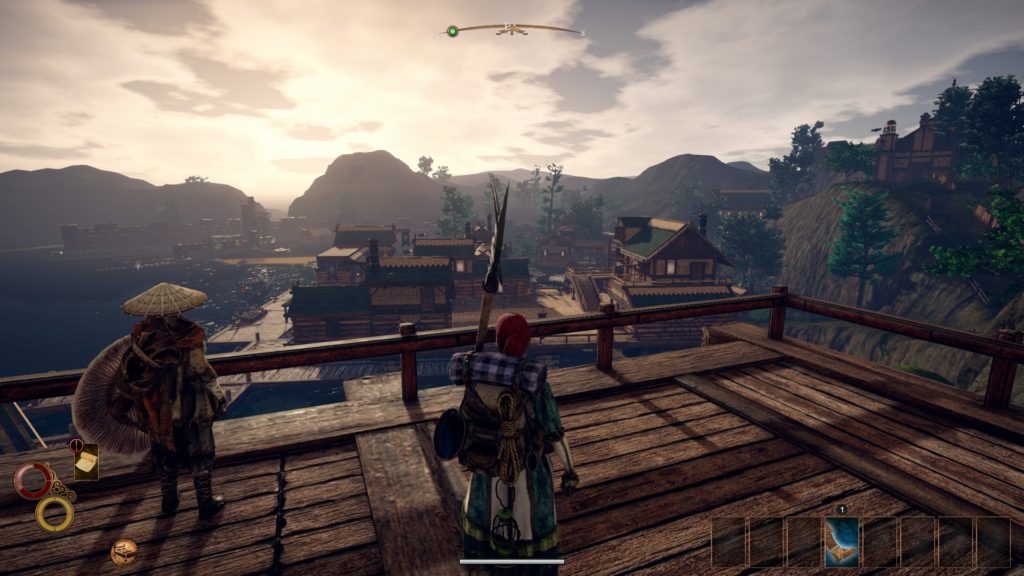
Once you have paid you debt, the world opens up and gives you the option of visiting four giant regions. The locations are not that huge, especially compared to other popular AAA open-world RPGs, but Outward has a very unique way of dealing with travelling and exploration. Namely, it has no fast travel, none at all. You literally have to walk everywhere, and if it takes twenty minutes to walk through the entry point of the map to the main city, then you’ll have to walk for twenty minutes every time you want to visit that city. That is hardcore, but you know what is even more hardcore? The storage chests in different cities are not linked either. No magic teleportation of players and no magic teleportation of items. Did you leave that special crafting component in the starting town Cierzo while you are actually in the desert city of Levant which is two maps away? Well, too bad. Start running.
Another unique feature is that Outward has no minimap or mission pointers. It does have a static map you can check, like in real life, and try to figure out where you are approximately on that map based on the landscape. It works surprisingly well, though having no maps and pointers in caves can get a bit claustrophobic.
You also can’t manually save in Outward, it saves automatically when you sleep, enter a city or switch regions. However, if you are savvy enough you can dig out the save files deep within the Steam folder and roll back your save by deleting the latest one.
An interesting solution is how the game handles death. You can’t really die in the game, if you get wasted you simply get dragged somewhere else. That somewhere else might be back home, a friendly cave with a friendly monster, or a bandit camp jail where you lose all your gear and items. We used the delete save file option when we got captured by much higher level bandits and realised there is no way in hell we can get out of that camp without our weapons.
Oh, there is also a talent system, which will be really confusing at first, so best google it before committing to anything, because you can’t really re-talent. You have been warned. There aren’t any preset classes, you just buy skills from different trainers. That means you can technically combo things together, but I ended up being a two-handed weapon warrior, and my partner in crime became a pyromancer.
Lastly, the game also has an overarching story involving three factions that may or may not have all betrayed each other at some point and you can try to make them all play nice with each other. You can also join a faction officially, have a proper house in their capital city and get some bonuses like +15 attack, which is neat.
The Good
As listed above, the game has some very hardcore elements, e.g.no fast travel, no minimap, no guiding quest icons, and limited inventory, and to be honest, they make Outward very atmospheric. There is something magical about venturing out the first time with your flimsy gear, not daring to go too far, and being afraid of the most meagre animals. Then there is the process of slowly building up your reserves, getting better backpacks, armor, weapons, tents, water bags, being able to go out further and further before you have to run back to safety.
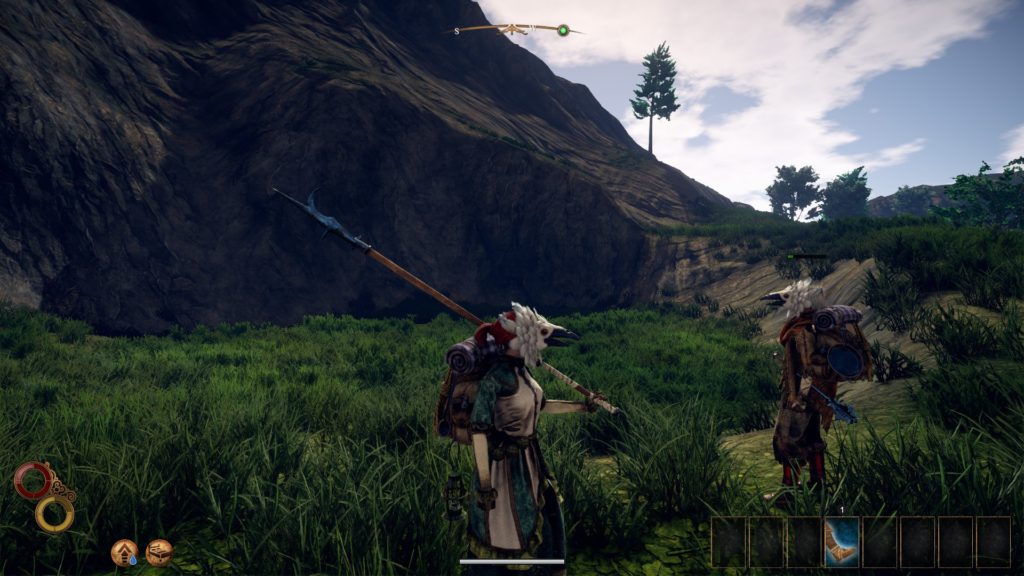
Navigating based on a static map is probably the best feature of the game. The moments when you are just standing on a hill, looking around, trying to match the scenery to the map will truly stay with you. Is that the old tower ruins or not? Does that resemble a statue of a huge face? Just like in real life, when you go out hiking. Except, in real life instead of ancient ruins you look for tiny trail markers painted on trees.
The adventure simulation part is flawless. The process of preparation is just amazing: organising your backpack, considering weight vs. value, the weather, how much food would we need, is there a clean water source nearby, do we plan to do any crafting while outside, or cooking, should I pack the salt just in case, what about this bundle of leathers. Then you go out, do some adventuring, and once night falls and you get tired, you need to find a camping spot, set up your tents, get a fire going, cook some dinner, decide how many hours of sleep and how many hours of guard duty each of you will get. There is something incredibly serene about this process.
The game also demonstrates harsh environments, well, harshly. The first time we ventured into the desert it was really difficult to traverse it. Our gear was too hot (regular armor is not recommended) and we didn’t have enough water. Getting through it was actually tough and nerve-wracking.
The crafting system is very satisfying. I think we tried most of the recipes, which is pretty rare for a game, we cooked a lot, built traps, crafted weapons, armors, and brewed alchemical mixtures.
There are four major regions and each has a city that can serve as your base of operation. All the main vendors are in these cities, you are also safe from the weather and monsters, and there is usually free water to drink. However, you only get your own place to house your stuff at the starting location, and then after doing some long questing you can get one more house in the city of the faction you have joined. So, what do you do in places where you don’t have a house with a bed, a kitchen, and a storage chest? You guerilla camp! You find a cosy spot somewhere in the city, put down your tents and a fire, and just keep your stuff on the ground next to your bedrolls. It is actually quite hilarious. Maybe you had to be there to get it.
The world feels big, despite having only four regions. It is full of weird buildings, statues, and objects, though you can’t interact with most of them. So it is either amazing world-building, or they just packed the game full of assets that look cool.
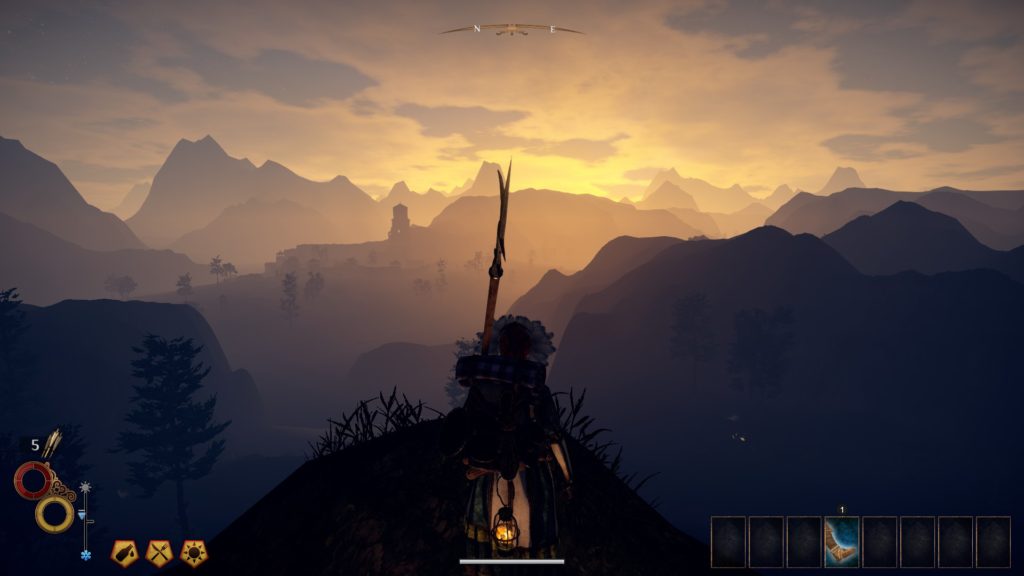
The overall story is very small and grounded, except for the bit with some god, but more or less you start as a nobody and kind of end as a nobody who owns real estate. I just think it is neat that no time dinosaurs are involved.
The Bad
First and foremost, there is a reason why fast travel exists in most open-world RPGs. Don’t get me wrong, there are games where the lack of fast travel works very well, e.g. The Forest, and it also worked very well in Outward when you only had to explore one region. However, the designers of Outward thought that combining no fast travel with the following things is a good idea:
- All the cities are on the edge of the map, preferably really far away from the entry points to the region. To maximise run time I presume?
- The main quest takes you all over these regions. You have to constantly run back and forth between cities which gets really really really really tedious after a while. We timed it, you have to run for twenty minutes to get from Cierzo to Levant. Twenty minutes of just running, depleting your stamina, walking for a bit, then sprinting again, then depleting your stamina, and so on and so on.
- The monsters re-spawn once you leave a region, so going back and forth between cities also means killing the same enemies over and over and over again. And monster kills don’t really grant you anything.
I think no fast travel would have worked nicely if the story was more linear. I would have been totally fine with running through every single region because I like exploring. What I don’t like, is walking through places I have been before for the tenth time. And the cities should be in the middle of the map so that it is easy to go out and then back.
Secondly, for some reason, some quests are timed in the game, and some are not, and you don’t know which one is which, and the ramifications can be pretty bad, so tread carefully. This is just bad design.
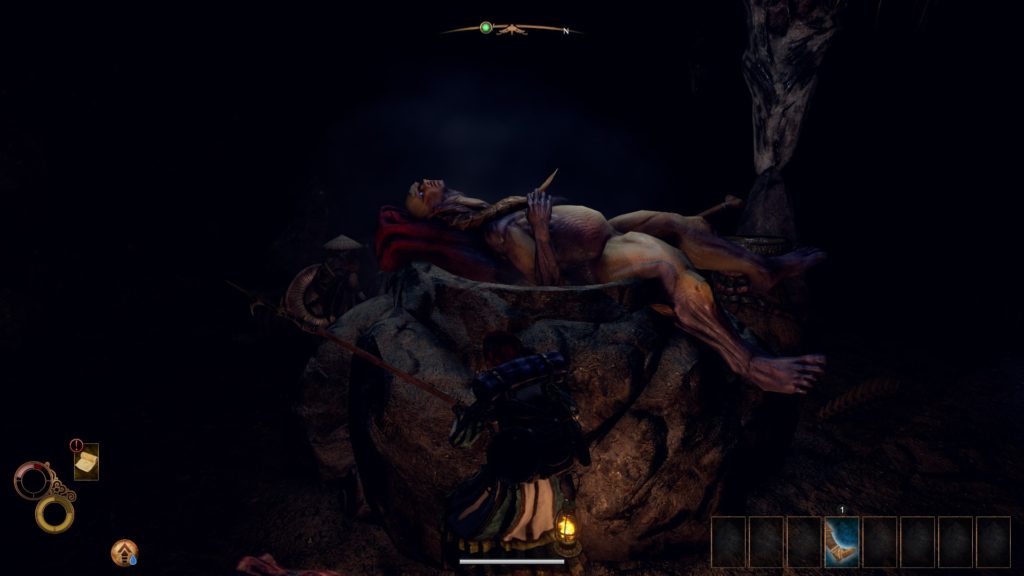
Some quests also have these inexplicable delays built in, for example, your next task is to wait three days before you can get the actual task. Did they add this as a padding for playtime? Or they wanted us to go exploring during that time? I don’t know, but it is annoying as hell.
The combat is atrocious. I can’t think of a better word. It is utterly pointless, you don’t get XP, probably no usable loot, and the mechanics are clunky and buggy. It is also very involved. You have to drop your backpack or you can’t roll properly and your stamina regen is shit. But then, how do you use all the potions and varnishes that you carefully concocted for situations like this? Well, you have to make sure you have that stuff in your pockets instead of your backpack. But what if it doesn’t fit? Well, too bad. You have to spend so much time managing your pocket inventory and hotkeys that it becomes tedious very fast. And in the end, somehow the fights are either “easy-peasy” or “I just can’t even” hard. There is barely any in between.
This might sound nit-picky, but the stamina-movement impairment math is anyone’s guess. Also, if you open the player statistics menu and hover over the symbols you don’t get any explanations on what they mean. Very confusing.
Since the combat is not great, the exploration bit gets annoying after a while too. Theoretically, I do want to explore all the regions and this is an open-world game, but do I want to accidentally walk into a monster who is inexplicably much-much higher level than anything we have encountered before and get killed in one hit? Not really. And yes, you don’t actually die, but you might wake up on the other side of the map, meaning you have to walk for a long-long time to get back to your destination.
You can also get your endgame gear pretty quickly, which again, renders the whole exploration bit boring. Sure, let’s check out that weird-looking hive, even though I know already that I don’t need anything from there. Once you have your gear and talents there is zero sense of progress and zero motivation to explore.
The areas look cool at a glance but then you quickly realise that they are almost completely empty. Most buildings are weirdly hollow, and even if there some objects lying around you can’t interact with them. From a gameplay perspective, the world is pretty desolate.
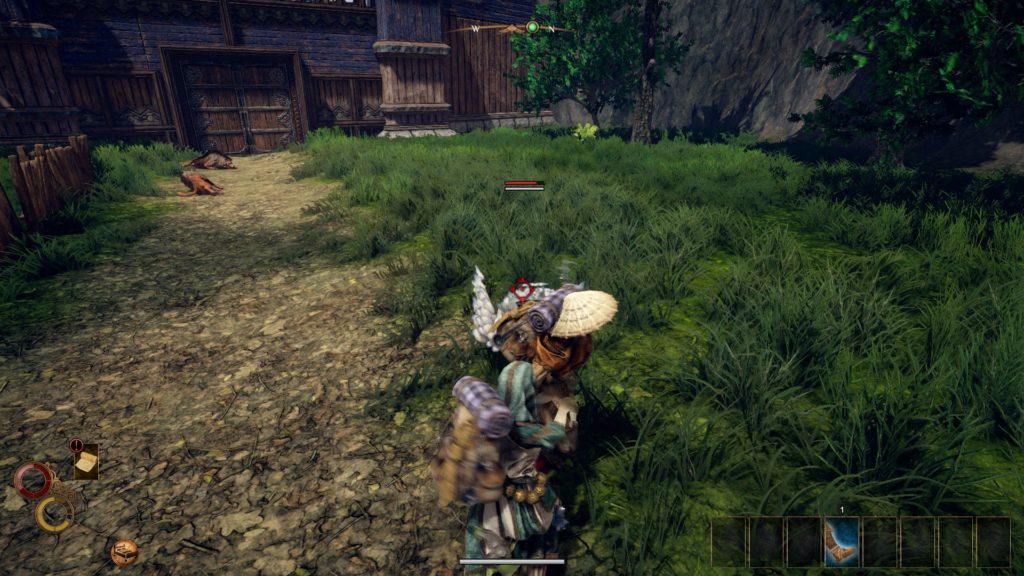
The story-telling is just…I can’t even describe it properly. It is very confusing and basically impossible to understand without reading up about it on the internet. We gave up on following the story very quickly. The game also does this weird thing where it has voice acting but also doesn’t really have it. Some lines are acted out but the speech doesn’t match the written text exactly, which makes the whole experience even more confusing.
Lastly, my biggest beef with the game that I just can’t forgive. The ending. You could consider this spoiler territory, but my main issue is with the gameplay and not with the actual events. So I won’t spoil the story, and to be honest I couldn’t spoil the story even if I wanted to, since I have no idea what was happening, but I will spoil some gameplay mechanics that happen during the last quest. You have been warned. So, you do something as part of your quest, it involves combat, and then the game prompts you with a question whether you want to travel somewhere far-far away really quick for the next part of the quest. Mind you, you do not initiate the conversation yourself, the dialogue window just pops it up once you are out of combat, and naturally, you will say yes since you do not want to run for like half an hour through a territory you have been through a hundred times already. Now, I didn’t have my backpack on when this question popped up, because I can’t have it on during combat, but I assumed that the game will be smart enough to teleport it with me, since it does that when we die or exit a cave. Well, it didn’t. All of a sudden I was in another region, in another city without my stuff, my food, my money. So then the final battle happens, and without our backpacks, naturally we wipe quickly, then the screen goes dark and declares that the battle has been won. I mean, I don’t even know how to react to this. Why were we needed for the battle at all then? What was the point of all this?
The first area is really good but after that it all goes downhill. It would have worked much better with let’s say two regions and smaller, more linear story.
The game also has this legacy system built in, where you can send gear from one playthrough to the next, but I found that very ambitious and hilarious. I don’t really see a point of replaying the game.
The Co-Op
The co-operation element of the game is okay. Managing our inventory together is very unique.
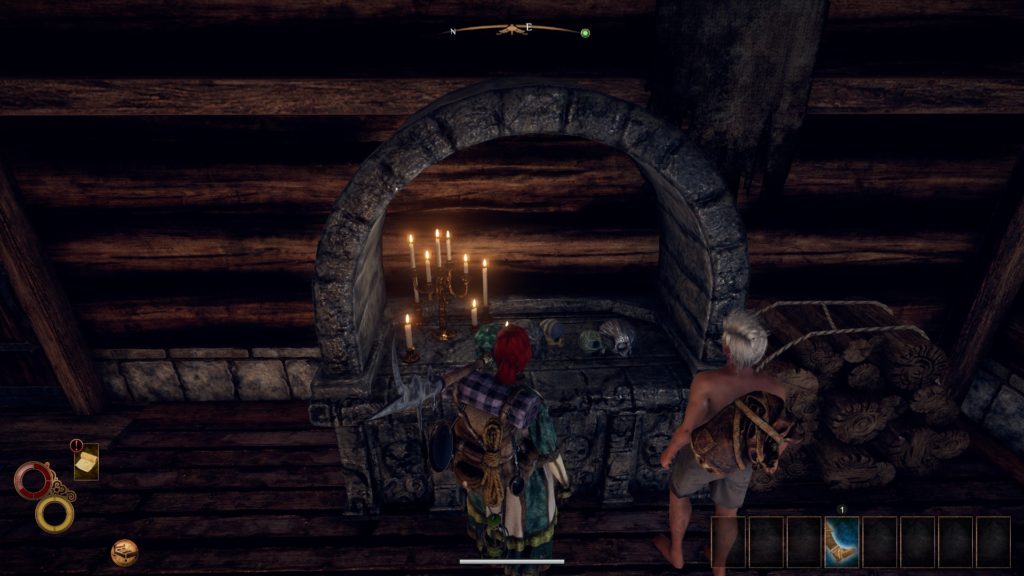
We also split up the crafting recipes, one person focuses on alchemy, cooking, the other on weapons and traps.
Exploring together is magical, while it lasts.
One important thing to note, only the host receives the quest rewards. That includes any boosts you get from your faction.
The Recommendation
As you can see above, this game is a mixed bag, and it is a very-very niche game. Overall it is still a good game, as long as you are willing to put up with the lack of fast travel and clunky combat system. The first ten hours are truly magical and memorable and will be remembered fondly. The ending wasn’t Game Of Thrones level of bad, it didn’t ruin the whole game for us.
So, if no fast travel seems like the worst idea ever to you, skip this game. If, however, you find the idea intriguing, you will have fun with Outward.
Info
| Release Year | 2019 |
| Genre | RPG, Survival |
| Difficulty | Medium |
| Number of Players | 1 to 2 |
| Length | 40 hours |
Rating
| Overall | Good |
| Story | Bad |
| Co-Operation | Good |